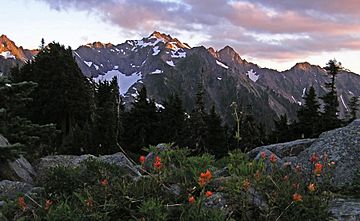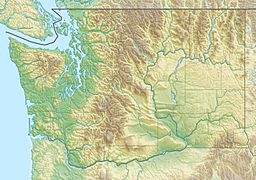White Mountain (Olympic Mountains) facts for kids
Quick facts for kids White Mountain |
|
|---|---|

White Mountain
|
|
| Highest point | |
| Elevation | 6,378 ft (1,944 m) |
| Prominence | 520 ft (160 m) |
| Geography | |
| Location | Olympic National Park Jefferson County, Washington, United States |
| Parent range | Olympic Mountains |
| Topo map | USGS Mount Steel |
| Geology | |
| Age of rock | Eocene |
| Climbing | |
| Easiest route | Scrambling class 2 |
White Mountain is a tall mountain peak in the Olympic Mountains of Washington state. It stands about 6,378-foot (1,944-metre) high. This mountain is located inside Olympic National Park in Jefferson County.
The closest higher peak to White Mountain is Mount La Crosse, which is about 0.95 mi (1.53 km) away to the northeast. There is also a glacier (a large, slow-moving river of ice) between these two peaks. Another large mountain area, the Anderson massif, is about 3.1 mi (5.0 km) north of White Mountain. Water from rain and melting snow on White Mountain flows into rivers like the Quinault River and Duckabush River.
Contents
Mountain Weather and Climate
White Mountain is in a special climate zone called the marine west coast climate. This means it gets a lot of rain and snow. Most of the weather comes from the Pacific Ocean.
How Weather Forms on White Mountain
Weather fronts, which are boundaries between different air masses, travel from the Pacific Ocean towards the Olympic Mountains. When these fronts hit the tall mountains, the air is forced to rise. As the air goes higher, it cools down and drops its moisture. This process is called Orographic lift. It causes a lot of rain or snowfall, especially in winter.
Seasons on the Mountain
During the winter, the weather is usually cloudy and wet. However, in the summer, high-pressure systems over the Pacific Ocean often bring clear skies. The best time for climbing White Mountain is usually from June to September, when the weather is more favorable.
How White Mountain Was Formed
The Olympic Mountains, including White Mountain, are made up of special kinds of rocks. These rocks were formed from pieces of old ocean floor and sediments that were pushed up when Earth's plates collided.
Rocks and Glaciers
The main rocks are Eocene sandstone and basalt. Sandstone is a rock made from sand, and basalt is a type of volcanic rock. The mountains were shaped a lot during the Pleistocene era, which was a time when huge glaciers covered much of the Earth. These glaciers moved back and forth many times, carving out the valleys and peaks we see today.
 | Selma Burke |
 | Pauline Powell Burns |
 | Frederick J. Brown |
 | Robert Blackburn |



